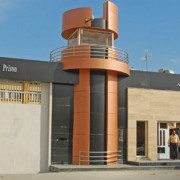Source: hra-news.org
Translation by Iran Press Watch
Tuesday, 9 September, 2014

HRANA- According to recent reports, there are now seven Baha’i women in the women’s ward and three Baha’i men held in Ward 6-1 of Vakilabad prison in Mashhad.
According to HRANA, the Human Rights Activists News Agency of Iran, at present there are nine Baha’i citizens being held in the Vakilabad prison of Mashhad. Among these nine, seven are women held in Ward five for female prisoners, and there are three men held in Ward 6-1.
The names and conditions of the seven Baha’i women in Ward five are as follows:
1) Sima Ishraqi – sentenced to five years in prison for acting to undermine national security and propaganda against the government through membership in and promoting the Baha’i Faith.
2) Rozita Vasseqi – sentenced to five years in prison for acting to undermine national security and propaganda against the Islamic republic through membership in the Baha’i Faith.
3) Sonia Ahmadi – sentenced to five years in prison for undermining national security and promoting propaganda against the state through affiliation with the Baha’i Faith.
4) Nika Kholousi – sentenced to five years in prison for undermining national security and promoting propaganda against the state through membership in the Baha’i Fatih.
5) Nava Kholousi – sentenced to five years in prison for undermining national security and promoting propaganda against the state through membership in the Baha’i Fatih.
6) May Kholousi – sentenced to five years in prison for undermining national security and promoting propaganda against the state through membership in the Baha’i Fatih.
– May Kholousi was temporarily detained on 2 June 2014, (undecided)
– Dari Amri was temporarily detained on 2 June 2014, (undecided)
It should be noted that Noura Nabilzadeh, another female Baha’i prisoner in Vakilabad, was released on parole last month after serving five months of a five year sentence.
Similarly, in Ward 6-1, three Baha’i men have been imprisoned, and below are their conditions:
1) Davar Nabilzadeh – sentenced to five years in prison for undermining national security and promoting propaganda against the state through membership in the Baha’i Fatih.
2) Jalayir Vahdat – sentenced to five years in prison for undermining national security and promoting propaganda against the state through membership in the Baha’i Fatih.
– Shayan Tafazzoli, temporarily detained on 2 June 2014 (undecided)
An informed Baha’i activist reported to HRANA:
After the arrest of the seven leaders of the Baha’i community in Iran in 2008, small groups of Baha’is who have been administering and attending to the Baha’i communities and their essential needs voluntarily put at an end to their services. However, the intelligence ministry and revolutionary courts have determined that any legal activity of Baha’is that relate to their religious beliefs, and even the pursuit of education and scholarship, are acting against national security and are propaganda against the state, and are worthy of conviction. To avoid the call of international human rights organizations, with the ultimate goal of coercing all Baha’is to flee Iran, they arrest and persecute them (Baha’is) in a systematic and gradual manner. Many Baha’i prisoners in Iran were supposed to have been released after the implementation of the new Islamic penal code in 2013, but law enforcement and judicial authorities, who themselves approved the penal code, avoid upholding it. It is surprising, and it raises concern in addition to the above-mentioned example, that the Iranian judiciary and its authorities do not even uphold laws approved by their seniors, and a feudal system is spreading within the judiciary system. For instance, in 2013, during a visit to Mashhad, the Chief Justice of Iran (Sadeq Ardeshir Amoli Larijani) criticized judicial authorities of long temporary detentions; official documents show that some temporary detentions even lasted more than a year. Since then a new law has been ratified that sets the maximum duration of a temporary detention at two months. In the case of the Baha’i prisoners, this restriction has not been upheld.
Leave a Reply